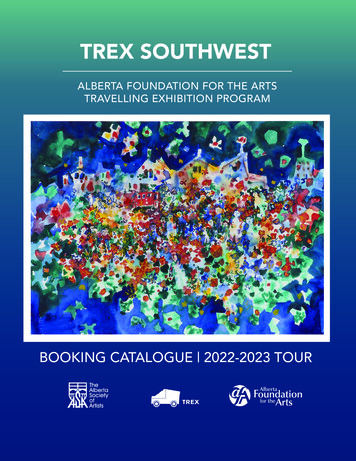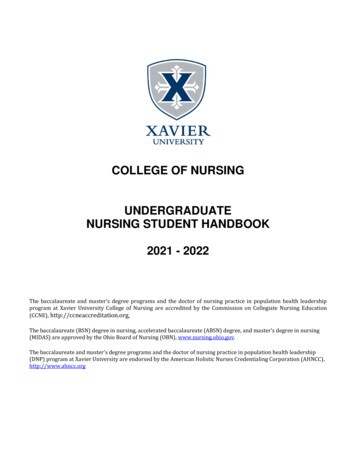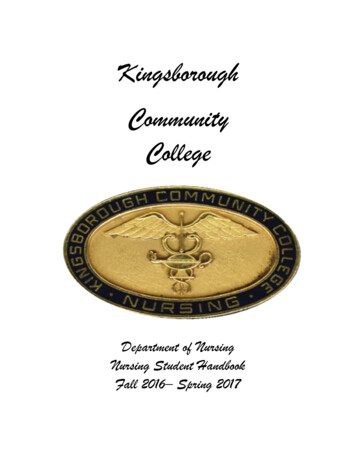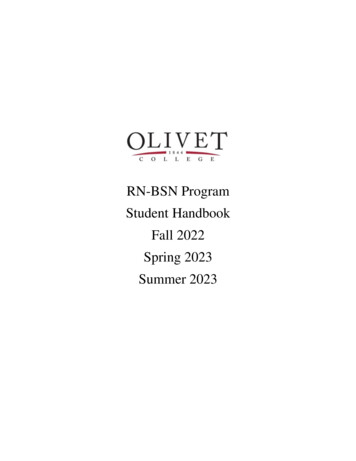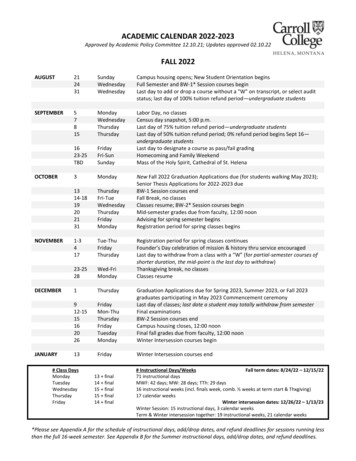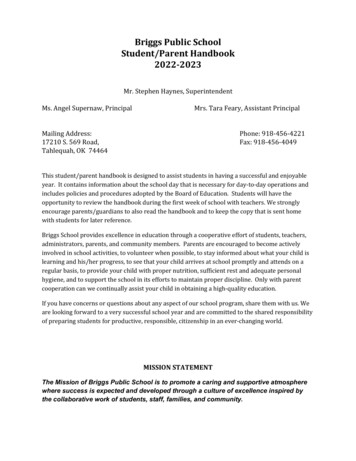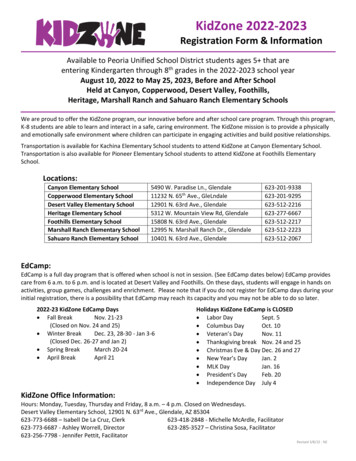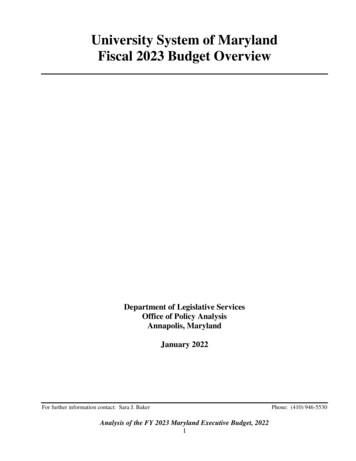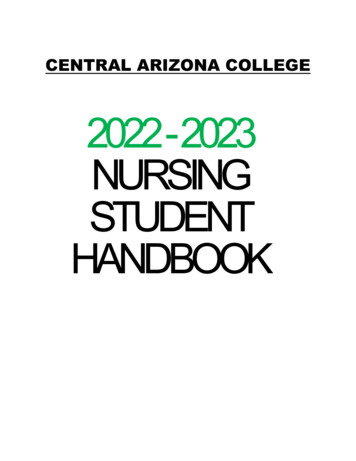
Transcription
CENTRAL ARIZONA COLLEGE2022-2023NURSINGSTUDENTHANDBOOK
CENTRAL ARIZONA COLLEGENURSING STUDENT HANDBOOKNURSING DIVISION8470 N. OVERFIELD RD.COOLIDGE, AZ 85128W BUILDING520-494-5330centralaz.eduThe Central Arizona Nursing Program is approved by:The Arizona Board of Nursing (AZBN)1740 W. Adams Street, Suite 2000Phoenix, AZ 85007Phone: 602-771-7800Fax: 602-771-7888Home page: http://www.azbn.govThe Central Arizona College Nursing Program is Accredited by:The Accreditation Commission for Education in Nursing (ACEN)3343 Peachtree Rd. NE, Suite 850Atlanta, GA 30326Phone: 404-975-5000Fax: 404-975-5020www.acenursing.orgThis Handbook prescribes standards of conduct for students enrolled in the Central Arizona College Nursing Program.Violation of any standard may serve as grounds for program dismissal, suspension, or other disciplinary action. TheNursing Division Faculty and Director reserve the right to make program changes as needed with reasonable notice and tochange any information requirements and regulations published in this document.
Table of ContentsNURSING STUDENT HANDBOOK . INursing Vision . 2Nursing Mission . 2Nursing Program Outcomes: . 2CAC Graduates . 2Action Oriented . 2Curriculum Concept Threads . 3Course Student Learning Outcomes . 5Guided Pathway. 5AAS ONLY . 5Guided Pathways for CONCURRENT ENROLLMENT PROGRAMS . 7Nursing Program Policies and Procedures General . 8College Resources for Students . 11Student Conduct Guidelines and the Student Bill of Rights . 12Appropriate Channels of Communication . 13Disciplinary Action Guidelines . 13Student Behavior and Dismissal from Program . 15Progression, Retention, and Success . 16Didactic, Lab, and Clinical Policies and Procedures . 16Communicable Disease. 16Jury Duty . 17Bereavement . 17Didactic or Classroom Policies . 17Testing Policies . 17Test Procedure . 19HESI Assessments . 19Written Assignments . 19Special Course requiments - NUR126 Dosage Calculation . 20Information Technology . 20Social Media. 21Lab and Clinical Components. 21Nursing Laboratory Equipment . 22Clinical Rotations, Lab and Simulation. 22CAC Nursing Program Dress Code . 22Clinical Setting and Nursing Laboratory . 23Clinical Guidelines . 24Safe Practice in Clinical and Simulation . 24Medication Administration Guidelines . 25Nursing Lab Open Hours . 25This Handbook prescribes standards of conduct for students enrolled in the Central Arizona College Nursing Program.Violation of any standard may serve as grounds for program dismissal, suspension, or other disciplinary action. TheNursing Division Faculty and Director reserve the right to make program changes as needed with reasonable notice and tochange any information requirements and regulations published in this document.
The Clinical Lab Prescription . 25Laboratory Policies . 26Safety Guidelines in the Skills Laboratory . 26Physical Safety . 27Lab Practice and Skills Check-off . 27My Clinical Exchange . 27Pregnancy . 28Accident or Injury in the Clinical Setting. 28Guidelines Regarding Exposure to HIV and Body Fluids . 29Accidental Exposure to Blood or Body Fluids . 30Drug Screening Guidelines and Zero Tolerance Policy . 30Drug testing policy . 31No Smoking Policy . 32Forms . 32HIPAA GUIDELINES. 33Course Grading . 34Course Withdrawal . 35Readmission Guidelines . 35Grading Scale . 35Grade Appeal . 36Graduation Application. 37Pinning . 37Student Representation. 38Emergency/Contingency plan . 38Unusual Ocurance guideline 38Probation .39This Handbook prescribes standards of conduct for students enrolled in the Central ArizonaCollege Nursing Program. Violation of any standard may serve as grounds for program dismissal,suspension, or other disciplinary action. The Nursing Division Faculty and Director reserve theright to make program changes as needed with reasonable notice and to change any informationrequirements and regulations published in this document.
1ChapterWelcome to CAC’s Nursing ProgramDear Nursing Student,Welcome to the Central Arizona College Nursing Division. We are very excited to be a part of your educationalexperience. Nursing is an extremely rewarding profession and offers numerous avenues for advancement andprofessional experiences.A professional nurse develops over time and you will see that who you are when you start the program is muchdifferent then who you are when you graduate. You will learn skills, master them, reflect on how you appliedthem in the clinical setting, evaluate responses to nursing interventions, provide comfort to your patients andclassmates, and build integrity and character. You will work closely with faculty who are experts in their fieldand they will guide you through the maze of courses, requirements and expectations that will result in youbecoming a respected member of the nursing profession.You will learn how to care for people when they are well and ill. You will use specific knowledge that comes fromnursing research. You will also find that the way you approach problems may change as you learn about safe,competent nursing practice. The nursing education environment is a place for sharing among students andfaculty that is mutually beneficial for both. Students bring their own uniqueness and life experiences to thelearning environment while, faculty bring their expertise and individuality.The Nursing Division Student Handbook contains valuable information that you will need to proceed through thenursing program effectively and efficiently. You will be required to follow the information found in the handbookand will be expected to reference this information as needed. Please read it carefully and keep it handy.Again, welcome to the Central Arizona College Nursing Division. We look forward to working with youthroughout the program to help you become a CAC GRAD. A CAC nursing graduate is competent and caring,accountable and responsible, able to communicate effectively, is respectful and ethical, applies leadershipskills through critical thinking, embraces diversity and develops a spirit of inquiry, and exhibits nursingexcellence in clinical practice. You are the next generation of CAC alumni and nurses in the community and wewant you to be the best.Sincerely,Tina Berry, PhD, MSN, MBA, HCM, RNDean of Nursing, Allied Health, and Industrial SciencesCentral Arizona College1
VISION AND MISSION OF THE NURSING PROGRAMN U R S I N GV I S I O N :ARIZONA’S LEADING CHOICE OF QUALITY NURSING EDUCATIONAND CENTER OF EXCELLENCETeaching safe, evidenced-based practiceReaching out to a culturally diverse population within our communityUnderstanding trends in nursing education and healthcare dynamicsEmpowering student learning through the use of innovation and technologyN U R S I N GM I S S I O N :N U R S I N GP R O G R A MO U T C O M E S :1.2.3.4.5.6.C A CG R A D U A T E SA C T I O NO R I E N T E DThe CAC Nursing Program learning outcomes are adapted from theNational League of Nursing (NLN) Educational Competencies Model andthe NLN (2010) Outcomes and Competencies for Graduates ofPractical/Vocational, Diploma, Associate Degree, Baccalaureate, Master’s,Practice Doctorate and Research Doctorate Programs in Nursing. At theend of the CAC Nursing Program, graduates can:Support healthy physiological, psychological, developmental, cultural andspiritual functioning for patients, families, communities, and self.Employ sound critical thinking/clinical judgment skills in practice usingevidenced-based nursing competencies to promote safe, quality, nursingcare.Develop a professional identity by integrating the nursing role usingintegrity, ethical and legal practices, and advocating for patients, families,and communities.Practice and maintain a respectful spirit of inquiry by examining evidencethat underlies nursing practice and offering insights to improve care topatients, families, and communities.Plan with other personnel within the healthcare organizational structure tomanage patient care through supervision, delegation, and coordination.Use and evaluate effective communication to achieve mutually definedgoals in collaboration with patients and other members of the healthcareteam.CAC Nursing Program Graduates are ACTION oriented. They are:AccountableCompetentTrustworthyIntegrity consciousOpen-Minded &NurturingThe Faculty and the Director of Nursing provide a contemporary curriculumthat requires graduates to be ACTION oriented. The Nursing core values of2
Accountability, Competency, Trustworthiness, Integrity, Open-Mindedness,and Nurturing align with the College’s mission and vision. Nursing is anurturing profession and strives to provide competent nurses to meet theneeds of the communities in which they serve. Through the integration ofethics, values, integrity, and patient centeredness, the student learns to useknowledge and clinical judgment/critical thinking to make decisionsinvolving individual patients, family, and communities. Safe, clinicalreasoning, and effective decision-making assists the student in buildingtrustworthiness with patients, families, and communities as well as thefaculty who observe the students’ growth. Students and Faculty consistentlyuse honest, open communication to facilitate a professional relationshipwhile learning from each other.A contemporary curriculum enables students to complete the program ina timely manner and begin nursing practice. Students are required tomeet standards that represent excellence in the didactic, simulation, andclinical areas while at CAC.Faculty members and the Director of Nursing integrate threads across thecurriculum to allow students to improve upon necessary skills practiced inthe healthcare setting. The nursing student learns the threads ofknowledge, skills, and abilities at higher and higher levels across thecurriculum in order to master professional standards. Students improveskills in math, writing, communication, teamwork, nursing knowledge andscience, simulation, technology, quality and safety, and personal andprofessional development. Students learn to experience organizationalenvironments that include cultural, physiological, psychosocial, spiritualand developmental differences. Didactic, clinical and simulation objectivesmeasure comprehensive nursing knowledge and psychomotor skill setsneeded to practice evidenced-based nursing care. Nutritional concepts aretaught at a basic level, and medical terminology starts the process toensure that students are aware of the language of health care.Threads Across the CurriculumFaculty believe that there are specific skills that need repetitive reviewthroughout the curriculum. These threads include but are not limited to:C U R R I C U L U MC O N C E P TT H R E A D S Math – dosages and calculations are required for medicationadministration and accuracy of the calculation is necessary to preventmedication errors.Writing – professional writing involves being able to communicate3
with other colleagues and healthcare personnel in a professionalmanner using the APA format.Communication and Teamwork – communication involves a clearmessage for both patients/clients and nurses while working togetherwith colleagues and other healthcare personnel to providecontinuity across disciplines.Nursing Knowledge and Science – a nurse uses the nursing processto provide nursing care to patients, families, communities, andpopulations and utilizes this knowledge to think critically.Simulation – simulation involves using realistic scenarios that providea learning benefit to students without the potential for harm in theclinical setting. Pre-scenario work along with debriefing strategiesassist the student to learn clinical practice.Informatics and Technology – informatics and technology assist insimulation and didactic areas including Blackboard. An ElectronicHealth Record (‘EHR) software program simulates authentic medicalrecords that students are required to document in for simulation andclinical practice.Quality and Safety – safety is the outcome of every patient encounterand providing quality care means that students are aware and utilizeevidence to make safe decisions.Personal and Professional Development – students are taught to takeownership for learning and to work with faculty to improve the processof learning. Students are expected to provide faculty with feedback toidentify strengths and opportunities for improvement in each courseand as a program overall.Cultural, Physiological, Psychosocial, Spiritual, and Developmental(Holistic) Perspectives-these perspectives repeat throughout thecurriculum and apply to every patient’s health. Faculty provide manyopportunities to teach and review the application of these principlesbased upon the developmental assessment of the patient throughdidactic, simulation, and clinical learning.Nutrition- basic nutritional principles repeat so that students canadequately learn how the patient can improve healthy eating. Studentsteach nutrition concepts using educational principles.Medical Vocabulary – medical vocabulary is important for learning tocare for patients. The application of this vocabulary is evident in thetest questions that students are required to answer and thesimulation/clinical areas that students practice skills in. Critical thinkingrequires the understanding and analysis of these words as they apply4
to nursing practice.C O U R S ES T U D E N TL E A R N I N GO U T C O M E SEach course provides knowledge, skills, and abilities necessary todemonstrate competency and increased rigor throughout the program.The course learning outcomes are measures to determine howsuccessful nursing students are in meeting the knowledge, skills, andabilities necessary to apply concepts to classroom, simulation, clinical,and laboratory activities.Faculty review these outcomes on a course-by-course basis eachsemester. Students meet the course learning outcomes to progress in theprogram. The course learning outcomes are shared with students eachsemester in the course syllabus.G U I D E DP A T H W A YA A SO N L Y5
6
2ChapterThe Program of Study or Guided Pathway describes the program andthe courses students’ need to graduate. The first pathway is theAssociate of Applied Science (AAS) degree. Students take courses insequence. Progression in the program is dependent on the sequencingof courses. While a student can take general education courses alongwith nursing courses, most students take all the prerequisites andcorequisites prior to the program start to concentrate solely on thenursing courses.C O N C U R R E N TE N R O L L M E N TP R O G R A M SThe Concurrent Enrollment Programs at CAC allow students to earn theAAS with CAC and the BSN with either Northern Arizona University (NAU)or Arizona State University (ASU). Students who take the CEP tract andwho fail a course in the CAC or University pathway are automaticallywithdrawn from the University CEP. The student can continue with CAC inthe AAS pathway if only one course is failed (CAC). Readmission to theAAS program is contingent upon classroom space and available clinicalsites.If you are in the CEP program and have questions, please contact theDirector of Nursing or Program Assistant, Jean Halloran for questions aboutthe AAS portion of the program. If you have any questions about CEP, youmust contact the appropriate program (NAU/ASU).CEP programs are subject to change based the requirements of ourUniversity partners. For examples of CEP maps please go to the followingwebsites:Northern Arizona with-concurrent-enrollment-to-nau/Arizona /10/ASU-CEP-Nursing-Map21-22-1.pdf7
3N U R S I N GP R O G R A MP O L I C I E SA N DP R O C E D U R E SG E N E R A LNursing Program Policies may differ from College Policies and areaddressed in the following pages.Orientation Policy:All nursing students are required to attend orientation, which isscheduled by your instructor before the first. Please check in with theProgram Assistant the day of orientation or proceed to the room given toyou by the Director or faculty member.Orientation gives students a chance to meet others from each block andto network among peers. Faculty review coursework, clinical work, andsimulation work required for each course in addition to reviewing thesyllabus. It is also a day to become familiar with your Professor andreview the expectations of the course. Additionally, a mandatory mathtest occurs on orientation day for second and third block students. Ifstudents do not attend and take the math test, a reduction in points islikely. Remediation in math is mandatory prior to attending clinical forany score less than 100%.Background Check and Drug Screen:Students admitted to the program are required to have a negativebackground check and drug screen. The student pays for the testthrough Core Screening (or American Databank). A student whosebackground check and/or drug screen is positive must meet with theDirector to determine eligibility to stay in the program. A positive on oneof the screenings could result in dismissal from the program and isevaluated on a case-by-case basis using existing guidelines andpolicies.Insurance Requirement:Clinical affiliating agencies require that students have their own healthinsurance. During the first semester, the student is required to submit acopy of insurance coverage. The student is required to keep the nursingoffice updated of any change in insurance carriers. Insurance isavailable from various agencies. Information is available throughStudent Services on campus, the National Student Nurses Association,and information through educational pamphlets located in the nursingoffice.8
The student is responsible for all health care costs including requesteddrug screen or titers upon admission and while attending the nursingprogram. In the event of student injury suffered during clinical practice,emergency medical treatment occurs at the clinical facility per policy andprocedure. However, such treatment will be at the students’expense. Central Arizona College does not cover students injured ortaken ill while on the College campus or on College business.Professional Liability Insurance is necessary for each student.Immunization and BLS Requirements:All students must provide upon admission and maintain currentimmunization records through My Clinical Exchange (MCE).Immunization requirements are set by the college's clinicalpartners.TB testing is required on an annual basis upon admission and while inthe program. A student must have a two-step TB test if this is their firstTB test. A two-step TB test is one in which the student receives theintradermal test, has the results verified by an RN or designee 48 to 72hours later and repeats the test one week after the first test. Once thetwo-step is complete the first time, a student only requires one testannually. If a TB test has been positive in the past, a chest x-ray isrequired every two years in place of the annual TB Mantoux test. AnAlpha QuantiFERON serum test is available in place of the TB Mantouxtest (began SP 2019).If the student does not have previous immunizations documented, bloodwork (titers) can determine immunity. Students obtain the blood resultsfollowing an appointment with their provider. If immunity is positive,students can upload the documents to the portals requested to meet therequirements. If the result shows a lack of immunity, students may needadditional vaccines or testing. A list of all immunizations required by theNursing program is available in the Nursing office.Students must be BLS certified through the American Heart Association(AHA) as a health care provider. Certification expires two years from thedate of completion of the course. Students must submit a copy of theircurrent certification card and be in possession of it during clinicalrotations. If a student’s BLS certification is due to expire within thesemester that the student is in clinical, the student must renew so thatexpiration does not occur DURING the semester.Annual flu shots are required for Maricopa and Pinal County clinicalagencies. No student can attend clinical without current immunizationsas required by clinical agencies. The flu shot is seasonal and thereforerequired during flu season (generally between October and March).9
LNAAll students are required to possess a current LNA license or LPNlicense upon admission and throughout the program. The LNAdesignation requires the same training as the CNA course but requires afee to obtain the license.Enrollment in a nursing program satisfies the maintenance requirementfor LNA licensure for renewal. A student requests a letter from theDirector of Nursing to verify the clinical hours completed to renew theLNA license with the Arizona State Board of Nursing. An LPN licensefulfills the requirement. If a student requires additional informationregarding the LNA license, please contact the Arizona Board of Nursing(AZBN) for further information at http://www.azbn.gov.Essential Skills and Functional Ability Forms (Physical Exam):Students must be able to enter the Program and be physically andemotionally able to meet program requirements upon admission andthroughout the Program. The student is responsible for notifying theclinical instructor of conditions that impact the student’s ability to meettechnical standards.Students must meet all physical requirements as outlined on thefunctional abilities form during the entire length of the program.If a student is injured during the program they must be revaluated bytheir provider. Based on the injury the program reserves the right to askthe student to be cleared by a specialist prior to returning to theprogram. Detailed examples of how these physical requirements affect astudent during labs and clinical were supplied to you when you applied.If a copy is needed for you or your medical provider, please see theDirector of Nursing or Program Assistant, Jean Halloran.10
C O L L E G ER E S O U R C E SF O RS T U D E N T SReasonable Disability Accommodations:Central Arizona College welcomes students with disabilities into theCollege’s educational programs. If you have a documented disability,including a learning disability, and would like to discuss possibleaccommodations, please contact the Central Arizona CollegeAccessibility Resources and Services Office at 520-494-5409 or emailCheryl.Hernandez@centralaz.edu. Students must keep in touch withthe Accessibility Coordinator to review accommodations each year.Accommodation for physical disability cannot put any patient, student, orfaculty member at risk for physical injury. The student must be able todemonstrate any nursing skill frequently an autonomously withoutassistance. Physical accommodations cannot conflict with the jobdescription of a nurse’s duties defined by our clinical partners.Learning Center:The Learning Center provides a variety of services to students. Anystudent enrolled at CAC may obtain free tutoring from the cooperativeLearning Center. Tutoring referral forms are available from the NursingProgram Assistant.Students who need accessibility accommodations to take exams cantake their exams at the learning center. For more information, pleasereview the Testing Policy reviewed later in this manual.Library:The main college library is located on the Signal Peak campus. CACstudents have access to library resources. Remember that professionallibrarians are there to help you if you need guidance in finding or usingresources in the library. Students enrolled in non-nursing online courseswill have access to library materials and other online resources throughthe course site.Financial Aid:Many sources of financial assistance are available for CommunityCollege students. Consult your College Catalog for details. TheFinancial Aid Office is in the Student Services Building (M). There arenursing-specific scholarships and application information in the Collegecatalog. Please contact Mag
CENTRAL ARIZONA COLLEGE . NURSING STUDENT HANDBOOK . NURSING DIVISION . 8470 N. OVERFIELD RD. COOLIDGE, AZ 85128 . W BUILDING . 520-494-5330 . centralaz.edu . The Central Arizona Nursing Program is approved by: The Arizona Board of Nursing (AZBN) 1740 W. Adams Street, Suite 2000 . Phoenix, AZ 85007 . Phone: 602-771-7800 . Fax: 602-771-7888 .
